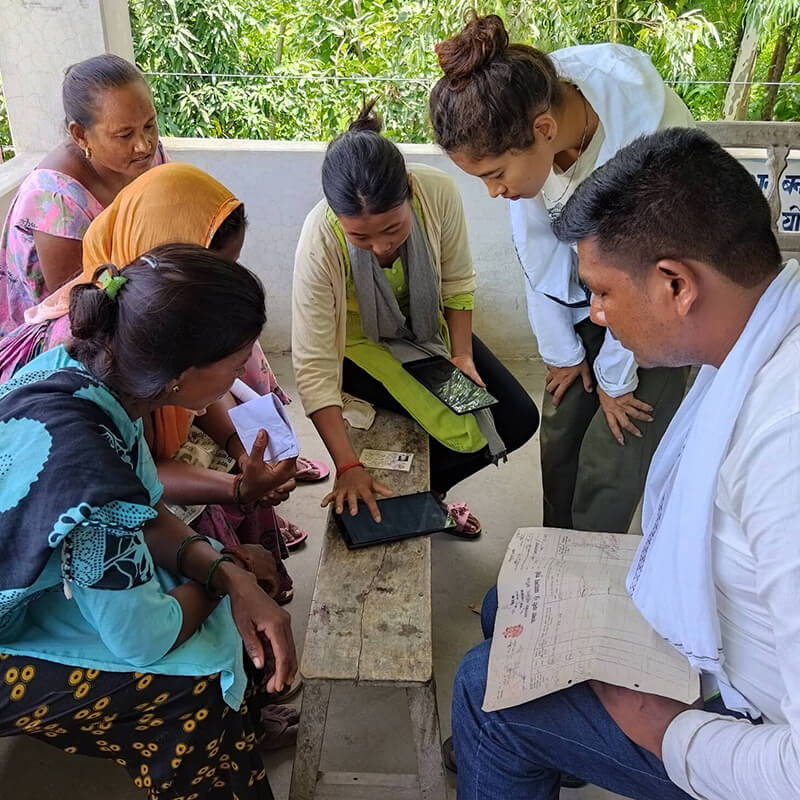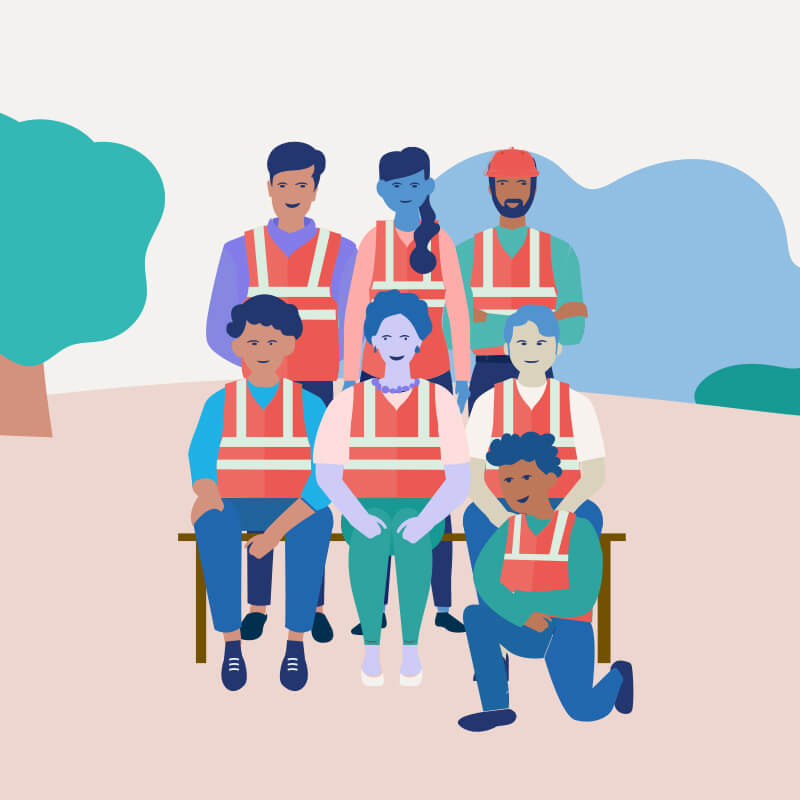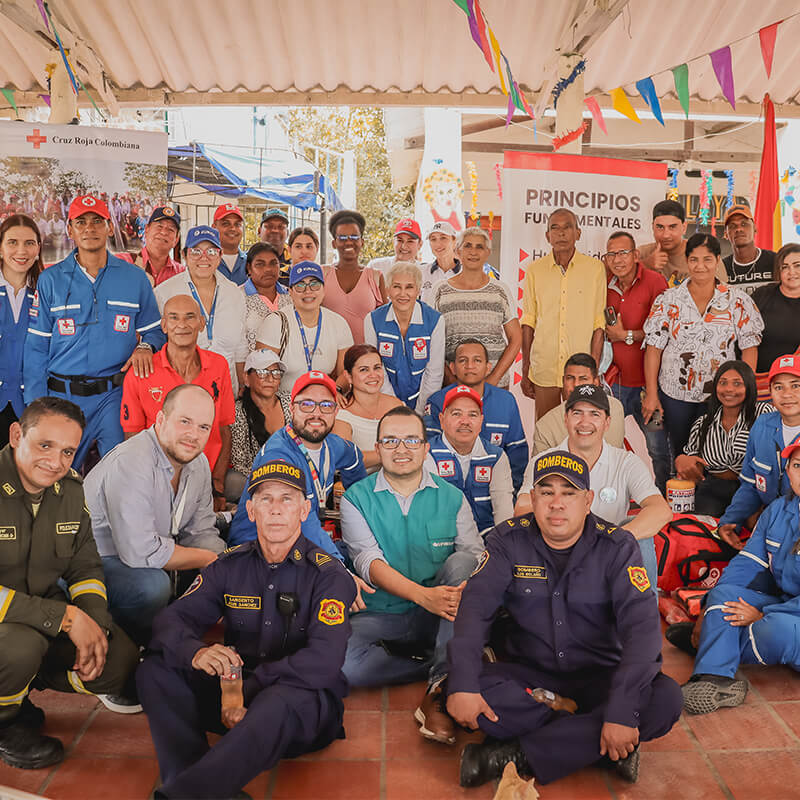Pillar spotlights
Photo: Delivering a session to a primary school class
Credit: Isle Listen
Empowering Frontline Communities for Climate Resilience

Recognizing 10 years of the Zurich Flood Resilience Alliance
Zurich Flood Resilience Alliance (the Alliance) reached a significant milestone in 2023: the Alliance marked the ten-year anniversary of its work, supporting people and communities to strengthen their resilience to flood risk.
Since the Alliance was launched in 2013, the initiatives and investment created have built flood resilience for millions of women, men, and children around the world, far surpassing original targets. As of the end of 2023, community programs and advocacy have positively impacted 3.14 million people and influenced USD 1.26 billion in funding towards flood resilience.
This incredible outcome is the result of diverse initiatives at different levels, working in collaboration with others, to support the operationalization of the United Nations Framework Convention on Climate Change’s (UNFCCC’s) Fund for Loss and Damage, commitments to global adaptation policy, national risk management programs, and provincial-level funding for disaster risk reduction.
Photo caption: Enrollment of farmers from the Sharad Smallholder Farmers’ Cooperative in the IBFI in Daulatpur, Ward Number 1 of Rajapur Municipality, Bardiya District, Nepal.
Photo credit: Practical Action Nepal
Our patient and systemic approach to building community resilience has yielded remarkable results. This demonstrates the value of long-term strategies that can bring about transformative change and shift systems. Working with the Alliance partners we will embark on an exciting new journey that expands our focus and scales our impact across 15 countries over the coming years. Moreover, the benefits of the approach have been extended to our collaboration with Zurich Business Units in specific cities in 9 additional countries.

Empowering Frontline Communities for Climate Resilience
The impact numbers represent the lives, livelihoods, and homes which have been protected, allowing people and communities to face a more secure future, despite flooding. They also show a clear shift from response and recovery to pre-event risk reduction.
Through the work of the Alliance teams, we are seeing remarkable changes which include: increased resilience against floods, resulting in fewer losses and damages; empowered communities; new resilience practices; and policies and plans that reflect community-defined priorities for resilience.
These achievements demonstrate the significant scale of change in our climate adaptation efforts, which we achieved by collaborating with organizations and communities across the globe.
A record year of systems-level change
We have helped to create systemic change at local, sub-national, and national levels. We work to empower communities to not only advocate for what they need but also provide them with the support and resources to implement solutions.
Our aim is to develop shared tools and approaches, combining the knowledge and expertise from members of the Alliance and the communities we work with. In this way, we have been able to increase the breadth and depth of our impact.
Albania
Shaping national policy for disaster risk management
As part of Albania’s work to develop national policies on disaster risk reduction, the Albanian Red Cross contributed critical insights and expertise.
Drawing on knowledge from their work in Flood Resilience Measurement for Communities (FRMC), the Albanian Red Cross worked alongside partners in technical working groups, playing a significant role in shaping these vital policies.
This collaborative effort successfully identified community priorities and effective approaches to building resilience. The result will be tangible changes that can be implemented on a national scale and will benefit the entire country.
“We facilitated a channel for the community’s voice to be heard and to influence policy discussions at national and subnational levels. Through sharing insights from our resilience work, the Albanian Red Cross emphasized the importance of community engagement as well as highlighting the criticality of early warning systems and the benefits of local infrastructure”.
Fatos Xhengo (Coordinator of the Disaster Preparedness and Response Program, Albanian Red Cross)
Building resilient communities and livelihoods
Mercy Corps Indonesia developed a resilient livelihoods approach to support upstream and downstream communities in Pekalongan. This approach enables people to adapt to increased flood risk and changing rainfall patterns, increases yields, and increases livelihood opportunities across the supply chain.
Discover “Tarudi and Muriah’s Story”.
This experience as well as findings from our Climate Risk and Impact Analysis are being used to influence government policies in Pekalongan and Central Java Province to include provisions for addressing land subsidence and building flood resilience through integrated water resource and coastal zone management.
So far, this work has positively impacted the lives of 1.3 million people.
The Pekalongan work was included in the COP26 loss and damage case study compendium, amplifying empirical evidence to the global discourse on Loss and Damage, as well as shaping the official statement of the Government of Indonesia.
Taking preventative measures to enhance and build resilience
In 2023, Cyclone Freddy hit southern Malawi. In only six days, the region was hit by six months’ worth of rainfall, causing severe floods and mudslides.
Concern Malawi had been working with communities to prepare for such events by implementing early warning systems, contingency plans, and other measures to reduce the risk.
After the cyclone, a review by Concern Malawi showed that these measures and community response were crucial for the most vulnerable people. Communities are now rebuilding using flood-resilient principles.
“The timely and effective cascading of early warning information to the communities at risk played a vital role in minimising the impact of Cyclone Freddy in the district. Despite being among the worst hit by the cyclone, the district recorded only a few losses, which is significantly lower than the number of deaths recorded in previous disasters such as Cyclone Idai (60). This success is largely attributed to the effectiveness of the Early warning system.”
– Concern
Installing disaster risk management technology through public-private partnerships
Vietnam’s people are among the world’s most at-risk of flooding, and ISET-International is working to support people in three particularly flood-prone provinces. Together with provincial government and private partners, they are working in 12 vulnerable communities, to help manage the impact of disasters. The measures include real-time flood gauges in Quang Tho and Quang Thai communities.
Equipped with solar panels and internal battery systems, these flood gauges can ensure continuous flood monitoring, even during power outages. They generate real-time data which will be integrated into the provincial monitoring network and deliver real-time flood information to the local government and affected communities. This is key to increase the rapidity and redundancy qualities of the flood early warning system. Data generated is also used for flood risk mapping, community risk raising, and for translating warning levels into practical information about flooding in various locations.
Read more about this initiative on the Flood Resilience Portal Vietnam Country Briefing – Flood Resilience Alliance – Flood Resilience Portal
Our Urban Climate Resilience Program enters into action
As our planet warms and weather patterns shift, floods, heatwaves and wildfires are increasing in frequency and intensity causing widespread disruption and damage to infrastructure and forcing people to flee their homes. Increasingly, people are migrating to cities, living in dense and precarious situations which are even more vulnerable to climate impacts. It is more important than ever to create resilient cities.
On 1 January 2023, we launched the Urban Climate Resilience Program to support urban communities in select cities in 9 countries across the globe. The Program is a collaboration between the Foundation, several members of the Zurich Insurance Group, the Zurich Flood Resilience Alliance and a number of city networks.
The Climate Resilience Measurement for Communities tool will allow the clear identification of priority actions in selected communities. This tool was developed by the Zurich Flood Resilience Alliance alongside the Z Zurich Foundation and Zurich through more than a decade of climate resilience work in communities across the world.
The Urban Climate Resilience Program consists of a four-step approach:
- Identify and engage with urban communities in need
- Conduct in-depth analysis of each community’s climate-related issues
- Plan, develop and deliver customized solutions
- Capture learning and scale the program
In 2023, the Urban Climate Resilience Program went into implementation in a number of cities alongside committed city actors:
- C40 in Malaysia and Italy
- ICLEI in Turkey
- Resilient Cities Network in Malaysia and England
- IFRC in Spain and Australia
We also have pilot programs running to test the program in two cities in the US (alongside Resilient Cities Network), two cities in Ecuador (alongside Plan International) and three cities in Colombia (together with the Colombian Red Cross).
As an insurance provider, we see first-hand how climate change impacts urban areas with multiple and interconnected hazards. Zurich’s employees in these countries volunteer their expertise to support the development and delivery of intervention plans. Our commitment to supporting community resilience and adaptation is unwavering. A sustainable future depends on it.

A game-changing year: Setting our new climate strategy for future impact
Accelerating our global commitment to climate adaptation efforts, helping communities to build resilient futures
Building on a decade of achievements with the Zurich Flood Resilience Alliance, in 2023 we set out our new strategy for the future of climate adaptation efforts across urban and rural areas. This strategy recognizes that, despite increased investments from the Foundation, the challenge of handling climate change impacts cannot be addressed by one partner or program alone.
The Zurich Climate Resilience Alliance (the Alliance), an evolution of the Zurich Flood Resilience Alliance starting in 2024 and which focuses on 15 countries, seeks to identify key areas of policy and practice where we can build on the insights of our direct community programming , and create change at scale.
Over the coming four years we aim to impact at least 5.5 million people through the Alliance, with ambitions to create sustainable, positive change and a better future for up to 70 million people through our climate adaptation programming through to 2035.
Spanning cities across nine countries, our programming with partners from the Urban Climate Resilience Program (UCRP) works with Zurich’s teams by taking the learning from the past decade to showcase how resilience to climate hazards can be built in communities and then seeking to scale it by encouraging partnership with the private-sector. In time, as programs mature, we will be able transform even more lives and livelihoods through the UCRP.
After ten years of dedicated work, we are excited to see the measurable, life-changing impact of our climate adaptation initiatives – from bigger policy wins and increased funding to changes on the ground at a community level. With a long-term approach and collaboration with our partners, we have been able to develop innovative tools, shared knowledge and methodology that we continuously adapt and improve based on communities’ needs today and into the future.
We are determined to continue creating transformative change at scale, and call for funding and action which supports adaptation measures that are scalable and sustainable. We work to strengthen the interconnected systems which link governments, the public and private sectors and communities. By doing this, we can drive new policy changes and actions which bring about systemic change at a grass-roots level.
Photo cation: Delivery of flood response kits in Barranquilla, Colombia
Photo credit: Red Cross Colombia